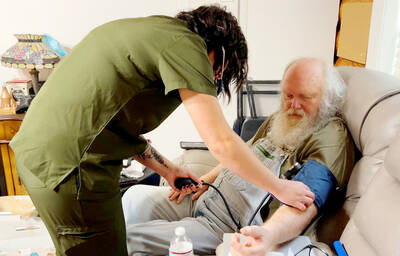It’s that time of the year again, when many of us start feeling a creeping sense of dread on suddenly remembering that Mother’s Day is fast approaching. If you haven’t started shopping yet, you have three days until May 10. There are plenty of gift options with a Taiwanese flavor that are quick and easy to buy, but will nonetheless make up for the years of backbreaking, heartrending labor that it took to raise you.
If your mom has a sweet tooth, treat her to a taste of Taiwan — literally. I-Lan Cake (宜蘭餅) sells traditional pastries with a twist. Try the kumquat biscuit, which is a variation on the pineapple biscuit (鳳梨酥), a national teatime favorite. Each one has an entire candied kumquat, which is tarter and chewier than pineapple paste, nestled in it (NT$500 for a gift box). Health-conscious moms will appreciate I-Lan Cake’s Yi-lan biscuit, which are just 0.1cm thick and advertised as “the thinnest biscuit in the world.” The baked treats come in a cornucopia of savory and sweet flavors, including maple syrup, coffee, green onion and cheese. The cookies literally melt in your mouth and are a low calorie alternative to fried potato chips (NT$35 per pack, or NT$350 for a gift bag of 10 packs). I-Lan Cake’s Taipei store is at B2, 300, Zhongxiao E Rd Sec 3, Taipei City (台北市忠孝東路三段300號B2樓), tel: (02) 8772-7535. For more information, check
www.i-cake.com.tw.
Yuan Soap (阿原肥皂) specializes in bath products for sensitive skin made from natural ingredients and water from Taiwan’s springs. Soaps with classic ingredients like moisturizing oatmeal or astringent tea tree oil are available, but for something more unusual, try ones made with energizing mulberry and chrysanthemum (桑菊花), soothing wild mugwort (野生艾草), relaxing juniper (檜木) or moisturizing green bean and Job’s tears (綠豆薏仁). Individual soaps aren’t cheap — most are NT$250 or NT$300 per bar — but if you really want to spoil your mom, buy her a gift box of four of Taiwan Soap’s best sellers for NT$1,100 or NT$1,190 for a box with soaps that have skin nourishing properties. Go to www.taiwansoap.com.tw for locations.
If your mom likes to unwind over a nice cuppa, head over to Bee Coffee (蜂蜜咖啡) at 87, Fuxing S Rd Sec 1, Taipei City (台北市復興南路1段87號), tel: (02) 2773-2072. Crowded and lit with fluorescent lamps, the combination store and drink stand doesn’t seem like much from the outside, but inside there’s a huge variety of loose tea leaves sold by weight for reasonable prices. Try the rosebud tea (粉玫瑰朵), which looks like potpourri and is supposed to help alleviate muscle aches and make your mom even more beautiful than she already is (NT$100 for 50g or NT$400 for 200g). Sets of five pairs of bone china cups or saucers are NT$950 to NT$3,500 per set. See www.beecoffee.com.tw for more information.
Liuligongfang (琉璃工房) is one of Taiwan’s top artisan glassmakers. Founded in 1987 by actress Loretta Young (楊惠姍), the gallery combines traditional Chinese glassmaking with a modern aesthetic to make colorful art pieces and jewelry. Many of Liuligongfang’s handmade glass art works, which are crafted using the lost-wax casting method, go for tens of thousands of NT dollars, but you can buy a paperweight for about NT$7,900 or heavy, richly detailed pendants on a silky macrame cord for less than NT$3,000. Liuligongfang has galleries throughout Taiwan; check www.liuli.com for your nearest location.

Oct. 27 to Nov. 2 Over a breakfast of soymilk and fried dough costing less than NT$400, seven officials and engineers agreed on a NT$400 million plan — unaware that it would mark the beginning of Taiwan’s semiconductor empire. It was a cold February morning in 1974. Gathered at the unassuming shop were Economics minister Sun Yun-hsuan (孫運璿), director-general of Transportation and Communications Kao Yu-shu (高玉樹), Industrial Technology Research Institute (ITRI) president Wang Chao-chen (王兆振), Telecommunications Laboratories director Kang Pao-huang (康寶煌), Executive Yuan secretary-general Fei Hua (費驊), director-general of Telecommunications Fang Hsien-chi (方賢齊) and Radio Corporation of America (RCA) Laboratories director Pan

President William Lai (賴清德) has championed Taiwan as an “AI Island” — an artificial intelligence (AI) hub powering the global tech economy. But without major shifts in talent, funding and strategic direction, this vision risks becoming a static fortress: indispensable, yet immobile and vulnerable. It’s time to reframe Taiwan’s ambition. Time to move from a resource-rich AI island to an AI Armada. Why change metaphors? Because choosing the right metaphor shapes both understanding and strategy. The “AI Island” frames our national ambition as a static fortress that, while valuable, is still vulnerable and reactive. Shifting our metaphor to an “AI Armada”

When Taiwan was battered by storms this summer, the only crumb of comfort I could take was knowing that some advice I’d drafted several weeks earlier had been correct. Regarding the Southern Cross-Island Highway (南橫公路), a spectacular high-elevation route connecting Taiwan’s southwest with the country’s southeast, I’d written: “The precarious existence of this road cannot be overstated; those hoping to drive or ride all the way across should have a backup plan.” As this article was going to press, the middle section of the highway, between Meishankou (梅山口) in Kaohsiung and Siangyang (向陽) in Taitung County, was still closed to outsiders

The older you get, and the more obsessed with your health, the more it feels as if life comes down to numbers: how many more years you can expect; your lean body mass; your percentage of visceral fat; how dense your bones are; how many kilos you can squat; how long you can deadhang; how often you still do it; your levels of LDL and HDL cholesterol; your resting heart rate; your overnight blood oxygen level; how quickly you can run; how many steps you do in a day; how many hours you sleep; how fast you are shrinking; how